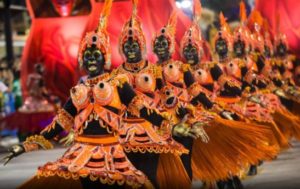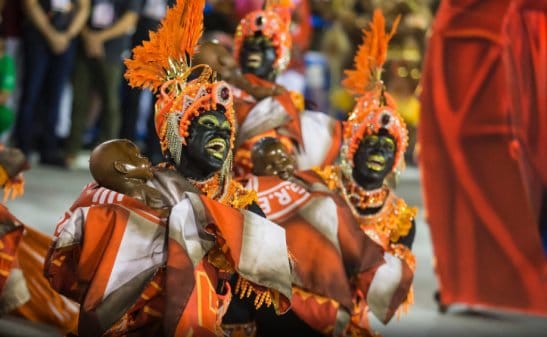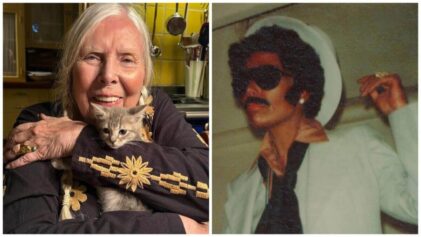
The Salgueiro said he opted to use blackface for the samba performance because he wanted to be “robust.” (Image courtesy of Women of Brazil)
A celebration intended to pay homage to Black women in Brazil soon erupted in controversy after members of a Rio samba school paraded down the streets wearing blackface.
The Salguiero samba school participated in a night of Carnaval celebrations Tuesday, Feb. 13, its dancers and drum troupe dressed in vibrant costumes, with their bodies and faces painted completely black. Some parade-goers took offense to the get-ups, which served as a bitter reminder of the racist 19th-century practice where white performers would paint their faces black to imitate and ridicule people of African descent.
Critics took to social media to voice their frustrations over the ill-conceived “tribute,” pointing out the backwardness of using a racist practice in a parade meant to celebrate Black culture.
“…A school like Salgueiro, which has such a cool history of portraying black culture, should have more responsibility for the parade and the moment in which we are living today,” one Twitter user wrote.”
“Hello #Salgueiro, instead of painting the dancers in black to represent Black women, why not hire bailarinas negras (Black dancers) ??????” another user tweeted.

Image courtesy of Black Women of Brazil.
What’s worse, a part of the performance meant to portray the first women who gave birth to the world was comprised mostly of men, according to Black Women of Brazil. They too were sporting blackface.
Salgueiro’s drum master, Marcão, denied any ill intent behind the costumes and pointed out that most of the dancers who participated are indeed Black.
“They are black people painting themselves black. It’s the color, it’s in the blood, there’s no way,” Marcão said. “And whoever is not is also in the blood, I think we’re all friends, we are brothers, we don’t have this stuff of racism. There are a lot of people taking it to the other side, but inside the bateria (drum troupe), no.”
Marcela Santana Pereira, who has been part of Salgueiro’s bateria for a decade, offered a similar response when asked about the blackface, saying, ” the intention of our bateria or the Carnivalesco (Carnival master), wasn’t at any moment with this issue of racism. If we took off the blackface, [he believes] it wasn’t going to give the impact that it had to give.”
Choreographer Helio Bejani called the performance an “artistic manifestation” whose “plot is afro, or African.” Bejani argued that he needed darker features to get his vision across, so they decided to paint the dancers black and have some of the men portray women.”
“I wanted to be robust,” he said. “Make-up was the only way to get the right tone.”


